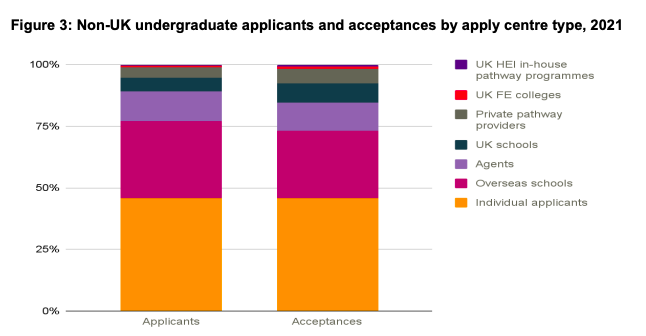Key stakeholders in the UK’s “crowded and complex” international student recruitment ecosystem need more support if the UK is to strengthen its global position in the study abroad segment, a British Council report has found.
The report, which aims to give “a pioneering overview” of the different channels through which international students enter UK undergraduate education, found that in 2021/22, almost half (46%) of all applicants submitted individual applications directly through UCAS’s online system.
However, it noted that many of these students were likely advised by agents or school counsellors.
“While traditional pathways into international higher education remain popular, this study demonstrates the increasing importance of international schools and agents in UK overseas recruitment,” said Jacqui Jenkins, global programme lead, international student mobility, British Council.
The second largest group of applicants is students applying via overseas schools, according to the report. Around 31% of applicants came from overseas schools, typically from English-medium international schools.
A gradual increase in the proportion of such undergraduate applicants signals the importance of engaging with international schools abroad, the report highlighted.
“International K-12 schools are vital for UK universities seeking to enhance academic quality, preparedness, and diversity in their international undergraduate recruitment. Engaging with international schools abroad (and domestically) will continue to be paramount in order to tap into this pool of talented students,” Lucy Stonehill, CEO and founder of BridgeU, told The PIE.
“However, it is essential to recognise that students at international schools consider and evaluate higher education in various countries, emphasising the need to promote the specific benefits and value of studying in the UK.”
The report highlighted that although edtech services have been developed to support counsellors in international schools, further support is needed to help counsellors and their students understand the benefits of UK higher education.
In December 2022, British Council launched its Agents and Counsellors Hub, providing training and best practice to agents and counsellors in a bid to ensure the UK maintains and improves the quality of the international student experience.
Agents and counsellors can use the hub to train up on the benefits and values of the UK as a study destination, how they can best prepare international students for studying and living in the UK, as well as the UK’s visa and immigration system and employment and post-study work options for students.
Currently, there are approximately 12,000 individual agents and counsellors signed up, but Jenkins reiterated the aim is to reach 20,000 by the end of the 2023.
The platform also allows international students and their parents to log on and check if their agent has the right level of knowledge via a public-facing searchable database of certified agents.
Such features are important, with the report highlighting that the diversity of channels to UK HE can create confusion among students who want to understand how to source trustworthy information.
This study demonstrates the increasing importance of international schools and agents
Some 12% of applicants applied through agents, while around 6% of non-UK domiciled applicants applied through schools or further education colleges in the UK and a further 4% were studying at UK pathway programs, according to UCAS data.
However, the report states that the number of students applying through pathway programs is believed to be far higher due to many students transferring to universities outside of the UCAS system.

Source: UCAS/British Council
The report described pathway providers as a “key stakeholder in the ecosystem, providing global reach, market intelligence and agility in product development” but notes that government policies and universities’ perceptions of them have not been particularly “favourable”.
Stakeholders interviewed for the report expressed concern surrounding agent aggregators, specifically around the need to appropriately filter and qualify applicants.
“Aggregators are now firmly a part of the ecosystem and wield recognisable authority and influence in the student decision making process,” the report said.
However, it highlighted a lack of in-depth understanding as to the role, responsibilities and oversight of what it called an “integral element” of student recruitment.
The post British Council weighs up paths to UK study appeared first on The PIE News.
